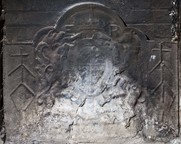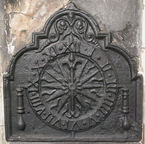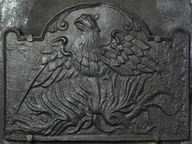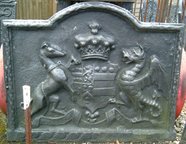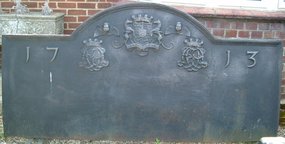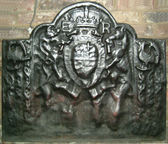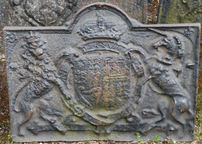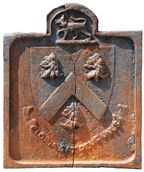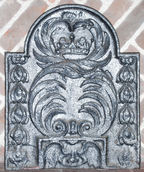-
1248
Description: Central arched rectangular shape with rounded corners; ovolo moulding all round; oval Tudor royal shield with garter surrounding, topped with a royal crown; dragon and greyhound supporters; initials split by crown; all details below shield illegible; rectangular extension panels on each side, with twisted rope edging; quasi mirrored arrangement of twisted rope lengths to form (from the top) a cross, a vertical pointing arrow, and a diamond shape with a central vertical line.
Notes: The detail of the extension panel is sharper than the armorial, indicating that the panel was cast with a worn copy of the armorial. Illustrated in Weaver, 1914, p. 16.
Inscription: E R [+ Garter, Harvo and royal mottoes, all illegible]
Arms: Tudor royal (prob. Henry VIII)
- Decoration tags:
- rectangular with round arch (shape)
- rope and ovolo moulding (edging)
- simple stamps
- whole carved pattern
- extension panels
- heraldic
- apotropaic
- armorial
- royal
- text
- objects
Manufactured: in the late-16th to early-17th century in the Weald area of England.
Current location: in private hands, Plaistow, West Sussex, England.
Citation: Weaver, L., 1914, Small Country Houses: their repair and enlargement (London, Country Life).
- Attached to series:
- Pounsley series
- John Harvo series
- Tudor royal armorial firebacks
-
589
Description: Double arched rectangular shaped; ovolo edging; central clock dial with Roman numerals separated by stops, sunburst inside, single hand with fleur de lys pointer; teardrop weights suspended from each side; symmetrical tendrils above.
Notes: One of the ‘hooked 1’ series of firebacks - the number ‘1’ is just discernable bottom left; two versions exist of this fireback, the other having finials above the suspended weights.
Copies of this fireback are known.
Inscription: I · II · III · IIII · V · VI · VII · VIII · IX · X · XI · XII / 16...
- Decoration tags:
- rectangular with round arch (shape)
- ovolo (edging)
- whole carved pattern
- text
- objects
Manufactured: in the mid-17th century possibly at Brede Furnace in the Weald area of England.
Current location: Ham House, Richmond, Surrey, England.
Museum number: 1139737 (part of the National Trust museum group)
- Attached to series:
- Hooked '1' series
- Brede group
-
590
Description: Quasi-arched rectangular shape, semi-circular protrusions on top corners; cavetto-moulded edging; two mirrored scrolls inside arch; a phoenix in flames, its wings displayed and inverted.
Notes: A defaced variant of no. 895, which bears the date, 1650, and the initials, IM; a loop normally at the top is absent, and careless pouring of the iron has obliterated some of the detail down the right side of the casting.
Copies of this fireback are known.
- Decoration tags:
- rectangular with round arch (shape)
- cavetto (edging)
- whole carved pattern
- planklines
- pictorial
- mythological
- animals
Manufactured: in the mid-17th century possibly at Brede Furnace in the Weald area of England.
Current location: Ham House, Richmond, Surrey, England.
Museum number: 1139821 (part of the National Trust museum group)
- Attached to series:
- IM series
- Hooked '1' series
- Brede group
- Phoenix firebacks
-
596
Description: Arched rectangular shape with base plinth; astragal and fillet edging (top and sides) with overlapping leaf pattern; mirrored wave pattern on plinth; shield, supporters, motto scroll and coronet of the 1st Earl of Ashburnham.
Notes: The arms are Ashburnham impaling Grey: Ashburnham: quarterly 1. Ashburnham - gules a fess between six mullets argent; 2. Holland - azure semee of fleurs-de-lys a lion rampant guardant argent; 3. Kenn - ermine three crescents gules; 4. Vaughan - sable a fess argent between three boys' heads couped at the shoulders proper having snakes enwrapped about their necks vert; and Grey - barry of six argent and azure in chief three torteaux. John, 3rd Baron Ashburnham, married Lady Jemima Grey in 1724. He was created Earl of Ashburnham in 1730 so the fireback probably dates between then and 1731 when Lady Ashburnham died. A sketch of an example of this fireback was made by J. Starkie Gardner c.1891 and is in his collection at the Victoria and Albert Museum, Archive of Art and Design (AAD/2014/8).
Copies of this fireback are known.
Inscription: LE ROY ET L'ESTAT [barely legible]
Arms: John, 1st Earl of Ashburnham
- Decoration tags:
- rectangular with round arch (shape)
- astragal & fillet (edging)
- whole carved pattern
- armorial
Manufactured: in the early-18th century probably at Ashburnham Furnace in the Weald area of England.
Current location: Mark Ripley Forge & Fireplaces, Northbridge Street, Robertsbridge, East Sussex, England.
Citation: Denny, H., 1937, 'Iron Fire-back', Sussex Notes and Queries, 6, 6, p. 189.
- Attached to series:
- Ashburnham family firebacks
- Personal armorial firebacks
-
597
Description: Arched rectangular; ovolo edging (top and sides only); arms of the Barony of Ashburnham: (1st & 4th) gu. a fess between six mullets ar. (Ashburnham), (2nd) az. a lion rampant between eight fleurs de lys ar. (Holland), (3rd) erm. three crescents gu. (Kenn); on an escutcheon of pretence a chevron between three boys heads couped at the shoulders each entwined around the neck with a snake (Vaughan). Supporters: two greyhounds sa. their faces, breasts, and feet ar. collared and lined or; on either side of the arms is a winged cherub’s head; below each is a monogram of ‘B J’ beneath a baron’s coronet.
Notes: The arms are those of John, 1st Baron Ashburnham (1656-1710), who married Bridget Vaughan, but the fireback dates from the time of his son, John, the 3rd Baron, created Earl in 1730.
Copies of this fireback are known.
Inscription: LE ROY ET L’ESTAT / 17 13
Arms: John, 1st Baron Ashburnham
- Decoration tags:
- rectangular with round arch (shape)
- ovolo (edging)
- carved stamps
- individual numbers
- heraldic
- armorial
- text
- humans
Manufactured: in 1713 probably at Ashburnham Furnace in the Weald area of England.
Current location: Mark Ripley Forge & Fireplaces, Northbridge Street, Robertsbridge, East Sussex, England.
- Attached to series:
- Ashburnham family firebacks
- Personal armorial firebacks
-
604
Description: Arched rectangular with curved shoulders; cavetto-moulded edging (top and sides) with twin scrolls on inside corners, and scalloped bottom edge; armorial; shield (32 quarters), mantling, supporters (bull and crowned lion), coronet, motto, 2 helms and crests (a bear’s head erased and ducally gorged, and a bear and ragged staff).
Notes: The impaled arms appear to be those of the Earldom of Huntingdon. The crests are of Hastings and Dudley, suggesting they are of Henry, 3rd Earl (c.1535-95), and his wife, Katherine (1548-1620), daughter of John Dudley, Duke of Northumberland. She was a child when they married in 1553. This is an incomplete casting, the full version of which includes a bottom panel with a repeated guilloche design. Christie's Masters and Makers Sale, South Kensington, 30 Nov 2010, lot 516 (£4,375).
Copies of this fireback are known.
Inscription: IN VERITATE VICTORIA (illegible, but verified on other castings)
Arms: Hastings, earl of Huntingdon, impaling Dudley
- Decoration tags:
- rectangular with round arch (shape)
- cavetto (edging)
- whole carved pattern
- armorial
Manufactured: in the late-16th century in England.
Current location: not known.
- Attached to series:
- Personal armorial firebacks
-
620
Description: Arched rectangular shape with rounded corners; ovolo within fillet moulding all round; oval Tudor royal shield with garter surrounding, topped with a royal crown; dragon and greyhound supporters; initials split by crown; inscription on a fillet between legs of supporters, behind garter finial; motto on an Ionic plinth at bottom; two rectangular side panels, each with a bird stamp (probably a swan, a Lancastrian badge) above a vine strip stamp repeated three times vertically.
Notes: One of two known variants of the John Harvo fireback incorporating extension panels with vine strips and 'swans'; the positions of the swans vary slightly between the two variants.
Copies of this fireback are known.
Inscription: E R [+ Garter, Harvo and royal mottoes, all illegible]
Arms: Tudor royal - prob. Edward VI
- Decoration tags:
- rectangular with round arch (shape)
- rope (edging)
- simple stamps
- carved stamps
- whole carved pattern
- individual letters
- extension panels
- heraldic
- armorial
- royal
- text
- animals
- objects
Manufactured: in the mid- to late-16th century possibly at Pounsley Furnace, Framfield in the Weald area of England.
Current location: Mark Ripley Forge & Fireplaces, Northbridge Street, Robertsbridge, East Sussex, England.
-
633
Description: Arched rectangular shape with small rhomboidal flanges in the corners of the arch; cavetto moulded edge on all sides, with a rose stamp on each curved enlargement of the moulding in the top corners; Stuart royal arms (1605-88, 1702-14) with lion and unicorn supporters, garter, crown and motto.
Notes: A recasting. A casting of the same fireback is in the collection of the Sussex Archaeological Society, but with the addition of a person's name impressed from the broken handle of a skillet (no. 405).
Copies of this fireback are known.
Inscription: [Garter and royal mottoes]
Arms: English Stuart royal
- Decoration tags:
- rectangular with round arch (shape)
- cavetto (edging)
- whole carved pattern
- armorial
- royal
- text
Manufactured: in the late-17th century possibly in the Weald area of England.
Current location: Mark Ripley Forge & Fireplaces, Northbridge Street, Robertsbridge, East Sussex, England.
- Attached to series:
- Stuart royal armorial firebacks
-
821
Description: Arched rectangular shape; fillet edging; shield, crest and motto in relief in a recessed arched rectangle.
Notes: The arms are of Weston, of West Horsley, Surrey: Sable, a chevron or between three leopards heads erased argent crowned or and langued gules; crest: a wolf passant ducally gorged or; motto: Gloria sat Deus unus - God alone is sufficient glory; the Westons were at West Horsley Place from the mid 18th century.
Inscription: GLORIA SAT DEUS UNUS [God alone is sufficient glory]
Arms: Weston family of West Horsley, Surrey
- Decoration tags:
- rectangular with round arch (shape)
- fillet (edging)
- whole carved pattern
- armorial
- text
Manufactured: in the mid- to late-19th century in England.
Current location: Mark Ripley Forge & Fireplaces, Northbridge Street, Robertsbridge, East Sussex, England.
- Attached to series:
- Personal armorial firebacks
-
646
Description: Arched rectangular shape; fillet edging; bell-flower column repeated on each side; at bottom, central rectangular panel, fillet edged, enclosing outstretched wings; above, intertwined leaves in figure-of-eight, enclosing a crown at the top.
Notes: This fireback incorporates features of the ‘Dutch’ style but within an English form.
- Decoration tags:
- rectangular with round arch (shape)
- fillet (edging)
- whole carved pattern
- heraldic
- plants
Manufactured: in the mid- to late-17th century in England.
Current location: Eastgate House, High Street, Rochester, Kent, England.
Museum number: A3484 (part of the Rochester Guildhall Museum museum group)
- Attached to series:
- Miscellaneous pattern firebacks
